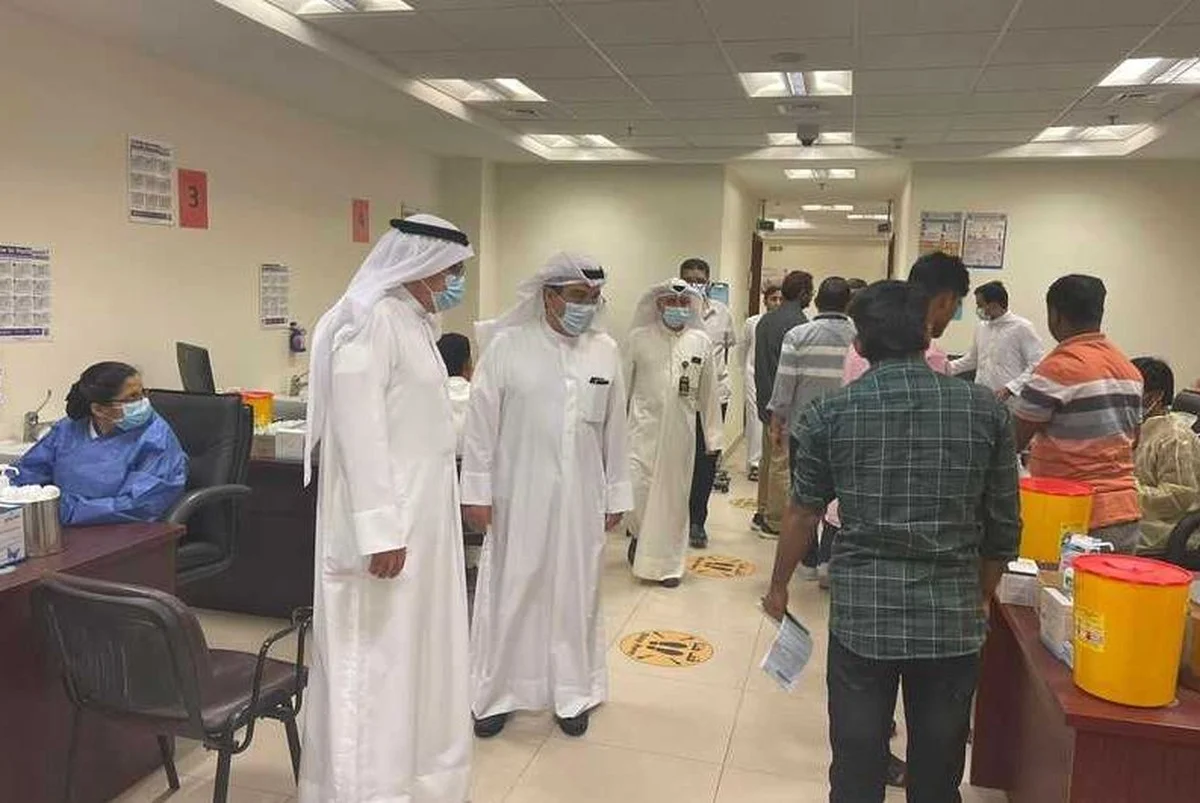03/04/2025
03/04/2025

KUWAIT CITY, April 3: The Expatriate Labor Screening Unit at the Ministry of Health plays a critical role in protecting public health by conducting comprehensive medical examinations to identify infectious diseases and ensure the health fitness of expatriates before they integrate into society. Dr. Ghazi Al-Mutairi, head of the unit, emphasized that the unit is the first line of defense against potential health risks in Kuwait, with more than 500,000 expatriates undergoing medical examinations annually.
Dr. Al-Mutairi highlighted the unit’s ongoing efforts to enhance health services in the country, including the integration of advanced technologies, increased capacity at examination centers, and strategic collaborations with Gulf Cooperation Council (GCC) countries.
Dr. Al-Mutairi explained that the Expatriate Labor Screening Unit plays a crucial role in safeguarding public health by conducting medical tests to detect infectious diseases, such as hepatitis B and C, HIV/AIDS, and tuberculosis. Additionally, the unit ensures that expatriates receive necessary vaccinations, including meningitis vaccines, and ensures that accompanying children are properly immunized.
Examination results are electronically recorded in the Ministry of Interior’s system to facilitate the monitoring of expatriates' health and expedite the residency process.
Currently, the Ministry of Health operates five main labor screening centers spread across Kuwait’s governorates, namely: Shuwaikh Main Center, Fahaheel Center, Rumaithiya Center, Jahra Center, and Subhan Center. These centers are open from Sunday to Thursday, 7:30 a.m. to 6:00 p.m. Dr. Al-Mutairi confirmed that with the growing number of expatriate workers, the ministry plans to establish additional screening centers in new areas to alleviate pressure on existing facilities and expand overall capacity.
The introduction of cutting-edge technologies, including artificial intelligence (AI) and electronic health records (EHR), is also helping to accelerate medical examination procedures and ensure more accurate diagnoses.
Dr. Al-Mutairi shared that the unit conducts around 500,000 to 600,000 medical examinations annually, including tests for tuberculosis, hepatitis, HIV, and other diseases. He highlighted that the most common diseases detected during these screenings are tuberculosis, hepatitis B and C, and HIV/AIDS.
When cases of infectious diseases are identified, re-examinations are conducted to confirm diagnoses, and appropriate measures are taken. Cases that pose a significant public health threat are removed, while treatable cases are referred to specialized medical centers.
However, the unit faces challenges, including the increasing pressure on screening centers due to a rise in the number of workers. To address this, the unit is working to develop and integrate more advanced medical technologies and improve cooperation with local and international bodies to enhance the quality and efficiency of examinations.
The unit is also focused on digitalizing its processes. By utilizing advanced electronic systems, the unit can record examination data more efficiently and issue results quickly. Moving forward, the Ministry of Health plans to implement a unified database for medical examination results, alongside the use of an EHR system to more effectively track health cases.
In addition, Dr. Al-Mutairi revealed that future initiatives include incorporating artificial intelligence and big data analysis to improve the speed and accuracy of medical procedures. These technologies will enable the unit to provide more effective health services for expatriates while enhancing operational efficiency.
Dr. Al-Mutairi emphasized the importance of Kuwait’s collaboration with other GCC countries to standardize medical examination procedures for expatriates. The Ministry of Health is actively working with these countries to ensure a unified approach to health screening and share health data for better coordination.
Furthermore, the unit organizes regular awareness campaigns aimed at educating expatriate workers about potential health risks and methods for disease prevention. These campaigns, which include distributing informational brochures in multiple languages and conducting health seminars, help ensure that workers are informed about their health responsibilities.
The COVID-19 pandemic significantly impacted the Labor Screening Unit’s operations. Certain services were temporarily suspended, and resources were redirected to support the nation’s efforts to combat the virus. Dr. Al-Mutairi noted that the pandemic underscored the importance of digital systems for rapid testing and the need to prepare for future public health emergencies.
Regarding the future of medical examinations, Dr. Al-Mutairi anticipates that innovations in artificial intelligence, big data analysis, and remote testing will revolutionize the field, improving accuracy and speeding up medical procedures.
Kuwait is also contributing to the promotion of public health across the Gulf region. By setting unified Gulf standards for testing expatriate workers and cooperating with neighboring countries to develop preventive health protocols, Kuwait is helping to ensure the safety and health of workers across the GCC.
Looking ahead, Dr. Al-Mutairi shared the unit’s vision to continue evolving through digital transformation, expanding screening centers, and integrating smart systems into healthcare services. These efforts aim to provide the best health services to expatriates and the wider community while keeping pace with future developments in the medical field.
The Ministry of Health’s dedication to enhancing its labor examination system, along with ongoing support from key health officials, ensures that the Expatriate Labor Screening Unit remains a vital component in protecting Kuwait’s public health.


